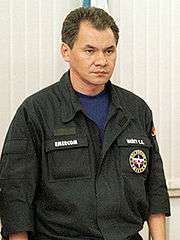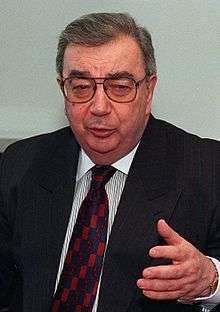Russian legislative election, 1999
Russian legislative election, 1999

|
|
|
|
All 450 seats to the State Duma
226 seats needed for a majority |
| Turnout |
61.7% |
| |
Majority party |
Minority party |
Third party |
| |
 |
 |
 |
| Leader |
Gennady Zyuganov |
Sergey Shoigu |
Yevgeny Primakov |
| Party |
Communist Party |
Unity |
Fatherland – All Russia |
| Last election |
157 |
|
– |
| Seats won |
113 |
73 |
68 |
| Seat change |
 44 44 |
New |
New |
| Popular vote |
16,196,024 |
15,549,182 |
8,886,753 |
| Percentage |
24.29% |
23.32% |
13.33% |
| Swing |
 1.37pp 1.37pp |
- |
– |
|
| |
Fourth party |
Fifth party |
Sixth party |
| |
 |
 |
.jpg) |
| Leader |
Sergey Kiriyenko |
Grigory Yavlinsky |
Vladimir Zhirinovsky |
| Party |
Union of Rightist Forces |
Yabloko |
Zhirinovsky Bloc |
| Last election |
– |
45 |
51 |
| Seats won |
29 |
20 |
17 |
| Seat change |
New |
 25 25 |
 34 34 |
| Popular vote |
5,677,247 |
3,955,611 |
3,990,038 |
| Percentage |
8.52% |
5.93% |
5.98% |
| Swing |
– |
 0.96pp 0.96pp |
 5.20pp 5.20pp |
|
|
|

Election results
Parliamentary elections were held in Russia on 19 December 1999.[1] At stake were the 450 seats in the State Duma (Gosudarstvennaya Duma), the lower house of the Federal Assembly of Russia. According to the 1993 electoral law, 225 members of the house were allocated proportionally, using statewide party lists, while other 225 members were elected in single-member constituencies, using first past the post system. Like in the previous election, this system resulted in a large number of parties competing for the proportional seats, as well as a significant number of independent deputies elected.
Rules
To secure a place on the ballot, parties had to have registered with the Russian Ministry of Justice one year before the election (instead of six months in previous elections). As an alternative to gathering 200,000 signatures, they had the option of paying a deposit of just over two million roubles, returnable if the party won at least 3.0 percent of the list vote. In order to increase proportionality, the law provided that if parties reaching the five per cent threshold got in total 50 per cent or less of the vote, parties with at least 3.0 per cent of the vote would also win seats by declining numbers of votes up to the point at which the total share of vote exceeded 50 per cent. However, if after this procedure the parties winning seats still had less than 50 per cent of the vote, the election was to be deemed invalid. In the single-member district ballots, if votes cast against all exceeded the votes of each candidate, a repeat election had to be held within four months. As a result, repeat elections had to be held in eight districts. Finally, as an alternative to gathering signatures in support of their nomination, single-member district candidates were also given the option of paying a deposit of 83,490 roubles, returnable if she won at least 5.0 percent of the district vote.
Campaign
The early election campaign saw the initial surge in popularity of Fatherland-All Russia bloc, led by the Moscow mayor Yuri Luzhkov and the former Prime Minister Yevgeny Primakov, which tried to capitalize upon the perceived incapacity of President Boris Yeltsin and the weakness of his administration. The tide had turned, however, when Yeltsin designated Vladimir Putin as Prime Minister and his eventual successor. On 24 November, Putin announced that "as a citizen" he will support the recently formed pro-government bloc Interregional Movement "Unity", headed by General Sergei Shoigu, a member of all Russian governments since 1994.
Results
| Party |
PR |
Constituency |
Total
seats |
+/– |
|---|
| Votes |
% |
Seats |
Votes |
% |
Seats |
| Communist Party | 16,196,024 | 24.29 | 67 | 8,893,547 | 13.73 | 46 | 113 | –44 |
| Unity | 15,549,182 | 23.32 | 64 | 1,408,801 | 2.17 | 9 | 73 | New |
| Fatherland – All Russia | 8,886,753 | 13.33 | 37 | 5,469,389 | 8.43 | 31 | 68 | New |
| Union of Rightist Forces | 5,677,247 | 8.52 | 24 | 2,016,294 | 3.11 | 5 | 29 | New |
| Zhirinovsky Bloc | 3,990,038 | 5.98 | 17 | 1,026,690 | 1.58 | 0 | 17 | –34 |
| Yabloko | 3,955,611 | 5.93 | 16 | 3,289,760 | 5.07 | 4 | 20 | –25 |
| Communists and Workers of Russia - for the Soviet Union | 1,481,890 | 2.22 | 0 | 439,770 | 0.68 | 0 | 0 | –1 |
| Women of Russia | 1,359,042 | 2.04 | 0 | 326,884 | 0.50 | 0 | 0 | –3 |
| Russian Pensioners' Party | 1,298,971 | 1.95 | 0 | 480,087 | 0.74 | 1 | 1 | New |
| Our Home – Russia | 790,983 | 1.19 | 0 | 1,733,257 | 2.67 | 7 | 7 | –48 |
| Russian Party for the Protection of Women | 536,022 | 0.8 | 0 | – | – | – | 0 | New |
| Congress of Russian Communities-Yuri Boldyrev Movement | 405,298 | 0.61 | 0 | 461,069 | 0.71 | 1 | 1 | –4 |
| Stalinist Bloc for the USSR | 404,274 | 0.61 | 0 | 64,346 | 0.10 | 0 | 0 | New |
| For Civil Dignity | 402,754 | 0.6 | 0 | 147,611 | 0.23 | 0 | 0 | New |
| All-Russian Political Movement in Support of the Army | 384,404 | 0.58 | 0 | 466,176 | 0.72 | 2 | 2 | New |
| Peace, Labour, May | 383,332 | 0.57 | 0 | 126,418 | 0.19 | 0 | 0 | New |
| Andreii Nikolayev and Svyatoslav Fyodorov Bloc | 371,938 | 0.56 | 0 | 676,437 | 1.04 | 1 | 1 | New |
| Party of Peace and Unity | 247,041 | 0.37 | 0 | – | – | – | 0 | New |
| Russian All-People's Union | 245,266 | 0.37 | 0 | 700,976 | 1.08 | 2 | 2 | New |
| Russian Socialist Party | 156,709 | 0.24 | 0 | 662,030 | 1.02 | 1 | 1 | New |
| Russian Cause | 111,802 | 0.17 | 0 | 1,846 | 0.00 | 0 | 0 | New |
| Conservative Movement of Russia | 87,658 | 0.13 | 0 | 125,926 | 0.19 | 0 | 0 | New |
| All-Russian People's Party | 69,695 | 0.10 | 0 | – | – | – | 0 | New |
| All-Russian Socio-Political Movement "Spiritual Heritage" | 67,417 | 0.1 | 0 | 594,426 | 0.92 | 1 | 1 | New |
| Socialist Party of Russia | 61,689 | 0.09 | 0 | 30,085 | 0.05 | 0 | 0 | New |
| Social-Democrats | 50,948 | 0.08 | 0 | 18,618 | 0.03 | 0 | 0 | 0 |
| Russian Ecological Party "Kedr" | – | – | – | 112,167 | 0.17 | 0 | 0 | 0 |
| Russian Patriotic Popular Movement | – | – | – | 10,481 | 0.02 | 0 | 0 | New |
| Russian Party | – | – | – | 7,918 | 0.01 | 0 | 0 | 0 |
| Russian Conservative Party of Entrepreneurs | – | – | – | 2,647 | 0.00 | 0 | 0 | New |
| Independents | – | – | – | 27,877,095 | 42.98 | 105 | 105 | +28 |
| Against all | 2,198,702 | 3.32 | – | 7,695,171 | 11.86 | 8 | 8 | – |
| Vacant seats | – | – | – | – | – | 1 | 1 | – |
| Invalid/blank votes | 1,296,992 | – | – | 1,429,779 | – | – | – | – |
| Total | 66,667,682 | 100 | 225 | 66,295,701 | 100 | 225 | 450 | 0 |
| Registered voters/turnout | 108,073,956 | 61.7 | – | 108,073,956 | 61.3 | – | – | – |
| Source: Nohlen & Stöver, University of Essex |
Further reading
- Hesli, Vicki L. & William M. Reisinger (2003). The 1999–2000 Elections in Russia: Their Impact and Legacy. Cambridge: Cambridge University Press. ISBN 0-521-81676-9
- reviewed by Luke March in: Slavic Review 63.4 (Winter 2004), 897–898.
References
- ↑ Nohlen, D & Stöver, P (2010) Elections in Europe: A data handbook, p1642 ISBN 978-3-8329-5609-7






.jpg)